World Bank education experts visited Finland
The Ministry for Foreign Affairs is financing ‘Coach’, a World Bank initiative to improve teacher development programmes. Coach experts visited Finland from 7 to 8 November 2022.

The World Bank and Finland are working together to reform education systems in developing countries. Improvements in teachers’ skills lead to better learning outcomes. Finland’s development cooperation appropriations have been used to finance the World Bank’s trust fund Foundational Learning Compact (FLC) for two years now. Finland is supporting global development efforts and, at country level, the Mozambique Coaching Pilot with a total of EUR 5.5 million.
The COVID-19 pandemic showed that common solutions and international cooperation is needed to address the global learning crisis. The pandemic aggravated the global learning crisis, and learning poverty has surged. An estimated 70 per cent of 10-year-olds in low- and middle-income countries are unable to understand a simple written text. The professional skills of teachers and the possibilities to maintain those skills is a key to improving learning outcomes both at home and in Finland’s partner countries.
Experts from the World Bank met representatives from the Ministry for Foreign Affairs, the Finnish National Agency for Education, the Ministry of Education and Culture, and the University of Helsinki. The Finnish Centre of expertise in Education and Development (FinCEED), which operates under the Finnish National Agency for Education, took part in the meetings, too. The experts also visited the Viikki Teacher Training School to learn about its teaching practices in primary school.
The methods of the global Coach initiative are already being used in customised forms in Mozambique, which is one of Finland’s partner countries. Education is one of our development cooperation priorities in Mozambique. Finland is funding the Mozambique Coaching Pilot, which aims to improve teachers’ continuous professional development by improving teachers’ coaching programmes, learning materials and lesson planning. The pilot covers already 60 schools in Mozambique, and the target is to expand it to about 700 schools in 2023. The pilot has been focusing on the Niassa and Manica provinces where 60 schools already are participating. The pilot’s target is to cover about 700 schools in 2023.
Education in Finland’s development policy and development cooperation
Quality education that is accessible to all has been one of the most important factors contributing to sustainable development. Education is also an important human rights question. Finland supports the achievement of the sustainable development goal for education through development policy and development cooperation.
As Finland’s own education system enjoys global renown, we have the opportunity and duty to participate in solving the global learning crisis on a long-term basis.
Finland’s development cooperation in the education sector supports:
- Quality of learning and competence of teachers
- Right to education, in particular for girls and persons with disabilities
- Young people’s work life skills and life skills